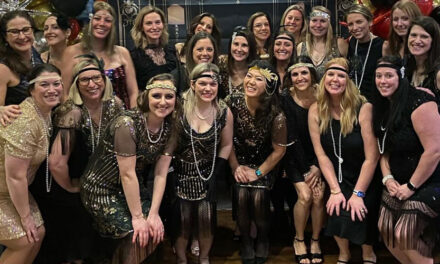Published August 7, 2019
By DAN TOMASELLO
LYNNFIELD —Two proposed bills that would implement ranked choice voting could lead to voter confusion if signed into law, Town Clerk Trudy Reid said in an interview with the Villager.
Ranked choice voting would allow voters to rank multiple candidates in order of preference. Then when the election is tallied, if no candidate gets a majority of the vote, an instant runoff occurs. In the runoff, the candidate with the least amount of votes is eliminated and those ballots are then redistributed to the voters’ highest-ranked remaining candidate. The process repeats until a candidate receives at least 50 percent of the vote and is declared the winner.
One version of the bill (S 414/H 719) would enact ranked choice voting in all elections except the presidential election. That would include county, state government and Congressional elections, in both the primaries and general elections. Voters would be able to rank as many or as few candidates as they want, and the secretary of the commonwealth would be responsible for making sure voting machines are prepared. The bill calls for the reform to take effect in the September 2022 state primary.
The other version (S 420/H 635) would make it easier for cities and towns to enact ranked choice voting for local elections. It would allow municipalities to adopt ranked choice voting through an ordinance, bylaw or ballot measure. Currently, municipalities can only do this by charter commission or home rule petition, which must be approved by the State Legislature.
Reid said the ranked choice voting proposals “sound very confusing.”
“I believe this will cause confusion and frustration for voters and possibly create even lower voter turnout,” said Reid. “As it stands, many local elections have little voter turnout due to the lack of candidates on the ballot. Should ranked choice voting be implemented, it would probably require electronic equipment or additional programming of some sort to aid in the determination, taking the human error off the election officials. Proper equipment or programming costs would further put a heavy burden on municipalities, especially those already with tight budgets.”
Reid also said the proposed bills would place greater demands on local election workers, who she said would need to explain how ranked choice voting works to residents and local officials.
“On Election Day, election workers are assigned to assist with affirmations of residency, provisional ballots, absentee ballots, etc.,” said Reid. “To ensure the election continues to run smoothly, additional staff may also be needed in order to handle the questions on ranked choice voting. With ranked choice voting, we would anticipate a great number of spoiled ballots by voters, which would cause a delay in their voting with a tie up at the check-in and check out tables and at the voting booths. There could also be a greater number of recounts petitioned simply due to the lack of understanding about the entire ranked choice voting process as well as a lack of trust in such a system.”
While Reid has expressed concerns about the two bills, activists recently met at the State House to celebrate progress on ranked choice voting efforts and highlight the two bills being considered by lawmakers.
“We’re all here in this shared effort to ensure that every voter in Massachusetts has a greater voice when they go to the polls,” said Mac D’Alessandro, the state director for Voter Choice Massachusetts, which organized the event last month.
While Reid expressed concerns about the proposed voting change, state Sen. Jason Lewis (D-Winchester), who represents neighboring Wakefield, said both bills would benefit the commonwealth’s voters.
“We need to do everything we can to expand voting enfranchisement and expand access to voting rights and democracy,” said Lewis. “Ranked choice voting is an important strategy to move us in that direction.”
Rep. Andres Vargas of Haverhill agreed.
“There could not be a more important time in American history since the Civil Rights era for democracy reform issues,” Vargas said.
Currently, only Cambridge has ranked choice voting for local elections, although Easthampton has submitted a home-rule petition to adopt it. The bill had a hearing in June and was reported favorably by the Joint Committee on Municipalities and Regional Government.
Reid said she has yet to speak to the city clerks from Cambridge and Easthampton about the ranked choice voting initiative.
“However, the North Shore City and Town Clerks Association will be having a meeting in September to learn more about the process from a clerk from Maine,” said Reid.
Maine voters approved a ballot question in 2016 that implemented ranked choice voting. The law went into effect before the 2018 midterm election.
Sen. Becca Rausch of Needham, the Senate sponsor of the local option bill, said lawmakers should not get in the way of communities that want to make the switch.
“At minimum, we as a legislature, should provide an easy path forward for our towns and cities to say ‘yes, we want ranked choice voting for our community,’” she said. “That is the minimum that we should be doing.”
Northampton resident Reed Schimmelfing pointed to the election in Fall River in March, where voters recalled Mayor Jasiel Correia II and then re-elected him. While over 60 percent of voters supported the recall, only 35 percent voted to elect him, far from the majority but more than the other five candidates in the race.
The recall effort came after Correia was indicted by a federal grand jury for fraud and tax evasion related to his tech startup SnoOwl.
Schimmelfing said that ranked-choice voting would have prevented Correia from winning with such a small percentage of the vote.
“Ranked choice voting does the instant runoff that would have given us a real majority voice opportunity,” he said.
D’Alessandro said Fall River is just a new example of a long trend in Massachusetts.
“It’s just the latest in a long line of examples of how flawed our current voting system is,” he said. “We’ve got incidents of competitive elections with three or more candidates in which the winner does not achieve the majority and that’s been going on in Massachusetts for 20 years.”
Advocates said ranked choice voting increases voter engagement and increases diversity in elections. According to Voter Choice Massachusetts, when Maine held its first ranked choice Democratic primary, over 87 percent of voters ranked more than one candidate.
The group also points to a 2016 Bay Area study, which showed that in cities that adopted ranked choice voting there was an increase in women of color winning office. In similar cities that did not adopt ranked choice voting, there was a decrease.
Organizers said they are hoping for a hearing on the bills this fall. Vargas said both bills would improve confidence in the election system.
“It’s about restoring faith in our democracy, that every single vote counts and that everybody can be a candidate,” Vargas said.
While Vargas argued ranked choice voting would benefit the commonwealth, Reid believes “ranked choice voting would open the door for unnecessary confusion and potential in accuracies at a time when voting systems and processes are already being scrutinized and challenged.”
— The State House News Service contributed to this report.




